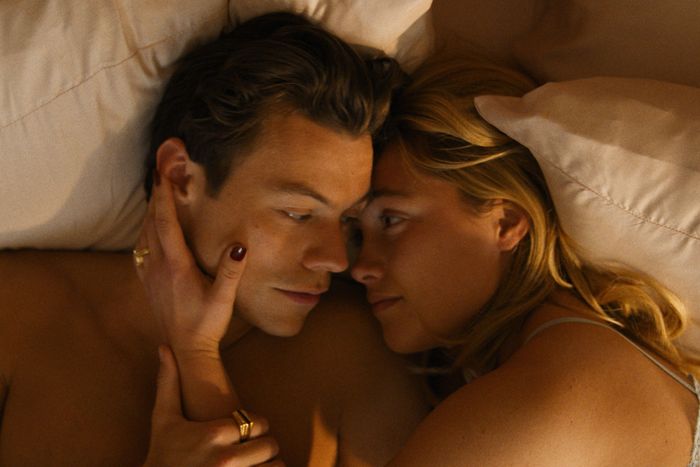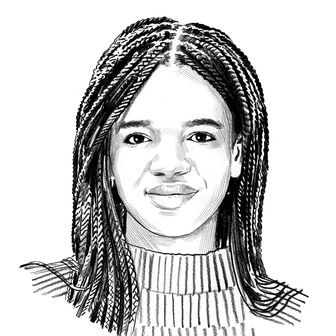
The critics are worried too, darling. First reactions to Don’t Worry Darling are in straight from Venice, giving us rapt and celebrity-drama-obsessed fans the first insight on the Oliva Wilde feature hitting theaters September 23. (What other movie opening this year provided us with our very own Zapruder Spitgate film? Can this so-called “movie” top amateur footage purportedly showing its pop-star lead huack-puh-ing on his innocent bystander of a co-star?). Based on the first reviews of the Stepford Wives meets Truman Show–esque psychological thriller — whose overall press-tour drama and himbo Harry Styles interviews supplanted the existence of the movie itself — Olivia Wilde’s second directorial effort is a mixed bag to critics. Florence Pugh is a favorite, most find Wilde’s direction skillful, and the movie’s visuals are called “striking,” but is it enough to elevate the movie’s prestige to the heights of its real-life drama? Even with its big twist of an ending? Maybe, critics agree, if there were more Chris Pine. Below, early takeaways from Don’t Worry Darling ahead of its New York premiere and September 23 theatrical release.
“Arriving at the Venice Film Festival on a rapidly growing tidal wave of toxic buzz, Olivia Wilde’s Don’t Worry Darling is neither as bad as some are clearly hoping it will be nor as good as it probably needs to be to overcome the public-relations nightmare its press rollout has become. Hearing all the rumors of a troubled set and of actors falling out with the director, one might have expected a cacophonous, cobbled-together catastrophe. If only. The film is smooth, competent, (mostly) well acted, and merely tedious.” —Bilge Ebiri, Vulture
“Many of the film’s most striking sequences were spoiled in the film’s marketing, from Pugh wrapping her head in cling wrap to Pugh being literally crushed by closing-in walls or Pugh racing across a vast desert. (Common theme: Pugh!) They remain impressive in the moment, but reveal that the images are bigger than the story they serve. It looks good, but it has nothing to say that hasn’t already been said before, and better, by other films. (TL;DR: It’s hard to be a woman in this world!)” —Kate Erbland, IndieWire
“The early scenes of Don’t Worry Darling are the film’s best, but even there it’s hard not to notice the top-heaviness with which the movie telegraphs its own darkness. (It’s not like we watch Chris Pine’s speech and think, “What a good dude!”) To really work, the film needed to reel us in slowly, to be insidious and surprising in the way that Get Out was. Instead, it’s ominous in an obvious way.” —Owen Gleiberman, Variety
“What remains consistent and undaunted throughout, though, is Pugh, a commanding and centered actor who makes the most of the hash she’s served. There’s a vivid scene in which Alice confronts the community’s shifty, sauntering overseer, played with a cult leader’s menacing appeal by Chris Pine. The two crackle well together, and in their shared moments the film briefly feels spiky and inventive. If only their chemistry was the foundation on which Don’t Worry Darling was built, instead of its stack of blurry copies of things done better elsewhere, years ago.” —Richard Lawson, Vanity Fair
“Working from a script by Katie Silberman, Carey Van Dyke and Shane Van Dyke, Wilde — who also co-stars as Alice’s best friend, Bunny — displays a stylish visual sensibility and gets solid performances from the cast with Pugh slamming it out of the park as the MVP. Yet all of that can’t spackle over the fact the film becomes less intriguing as it goes along. Sure, Don’t Worry Darling — whose very title reeks of paternalism and condescension of the worst order — comes from a woman’s viewpoint, an element that differentiates it from other films or TV series to which it might be compared. But it’s still not enough to keep the movie from slipping into predictability.” —Cary Darling, The Houston Chronicle
“Beneath its polished, very stylish outer sheen, though, it’s as hollow as the lives of its pampered but empty-headed protagonists. You can understand easily enough why Alice is so desperate to get out of the community — and perhaps why certain cast members have been so wary about endorsing the movie itself.” —Geoffrey Macnab, Independent
“Darling really is an auteur picture, replete with traits Wilde has let fly in recent interviews. It’s pompous (in its on-the-nose didacticism), humorless (satire doesn’t have to be funny, true, and this is one unfunny satire), condescending (the racial dynamic here, in which the sole Black female with a speaking part is relegated to a martyrdom prop, is a doozy), entitled (the recurring Busby-Berkeley-meets-Carnival of Souls bit has no utilitarian value, save saying “nightmare,” and it’s clear Wilde shot this indulgence just because she could, okay fine), and more. On the other hand, every now and then it latches onto a groove of narrative momentum and goes with it to some purpose.” —Glenn Kenny, Roger Ebert
“Pugh, the 26-year-old British actress whose fierce emotional intelligence belies her doll-like prettiness in films like Midsommar and Little Women (for which she received her first Oscar nod), gives Alice as much inner life as the skittering screenplay allows, and Styles, at least, looks fantastic in a suit. But the movie, whatever its pile of ideas about love, gender constructs, and modern living, never really transcends Stepford mood-board pastiche. It’s all nefarious and gorgeous, Darling, and strictly nonsense in the end.” —Leah Greenblatt, Entertainment Weekly
“The high-concept, low-satisfaction psychological thriller marks an ambitious upgrade in scope for Wilde from the character-driven coming-of-age comedy of Booksmart, and she handles the physical aspects of the project with assurance. It’s just a shame all the effort has gone into a script without much of that 2019 debut’s disarming freshness.” —David Rooney, The Hollywood Reporter
“Wilde’s [film] is largely fantastic: the sort of juicy but accessible studio production that have all but vanished since the 1990s.” —Robbie Collin, The Telegraph


